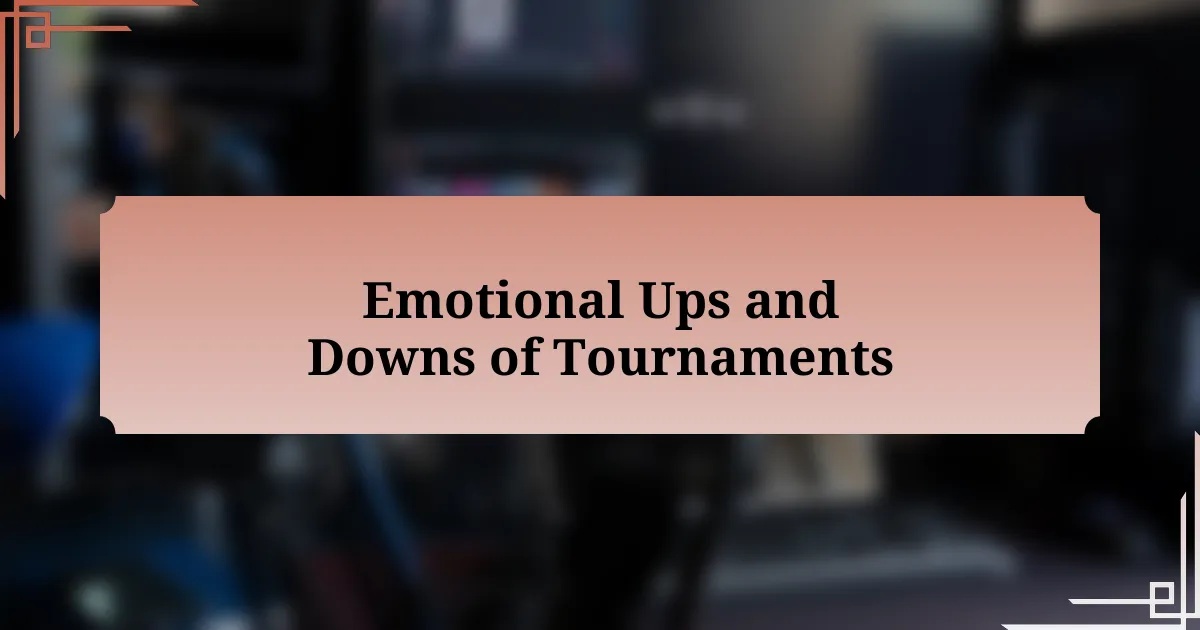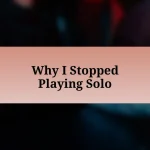Key takeaways:
- Tournaments evoke intense emotional highs and lows, impacting gameplay and relationships with teammates.
- Common challenges in eSports include anxiety, isolation, and navigating online commentary, which can affect self-confidence.
- Effective coping strategies involve establishing pre-game rituals, fostering supportive connections, and taking necessary breaks to prevent burnout.
- Building resilience requires embracing setbacks as learning opportunities and practicing self-compassion to improve emotional well-being.
Author: Evelyn Hartley
Bio: Evelyn Hartley is an award-winning author known for her compelling narratives and richly drawn characters. With a background in psychology and literature, she weaves intricate tales that explore the complexities of human relationships and the intricacies of the human psyche. Her debut novel, “Whispers in the Dark,” was celebrated by critics and readers alike, earning her a dedicated following. Evelyn’s work has been featured in various literary journals and anthologies, and she frequently speaks at writing conferences and workshops. When she’s not writing, she enjoys hiking in the mountains and volunteering at her local animal shelter. She resides in Seattle with her two rescue dogs, Luna and Milo.
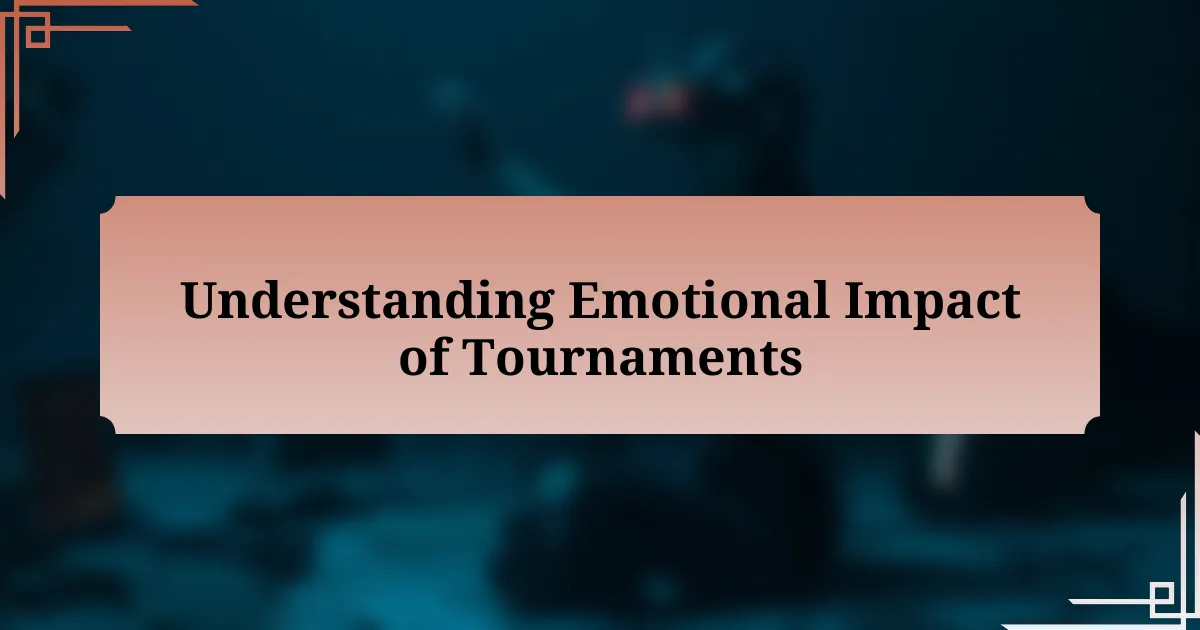
Understanding Emotional Impact of Tournaments
The emotional rollercoaster of tournaments is something I’ve felt firsthand. There’s that rush of adrenaline when your team secures a victory that’s almost euphoric, but it can shift just as rapidly to despair when you face a sudden defeat. Have you ever felt your heart race during a critical match, only to feel it drop when the outcome isn’t what you hoped for?
From my experience, the pressure to perform can amplify emotions significantly. I remember one tournament where I thought we had a solid strategy, but as soon as things didn’t go according to plan, I felt an overwhelming wave of frustration. It’s fascinating how invested we become in these matches, often leading us to question our skills and decisions—how many of you have replayed those key moments in your mind, wondering what you could have done differently?
The impact of these emotional highs and lows doesn’t just affect gameplay; it influences our relationships with teammates and the community as well. I’ve seen how a single miscommunication during a crucial moment can spark intense feelings, leading to arguments or, conversely, a deepened bond through shared challenges. How do you manage to keep your emotions in check when the stakes are so high? Understanding this emotional landscape is essential for anyone involved in eSports.
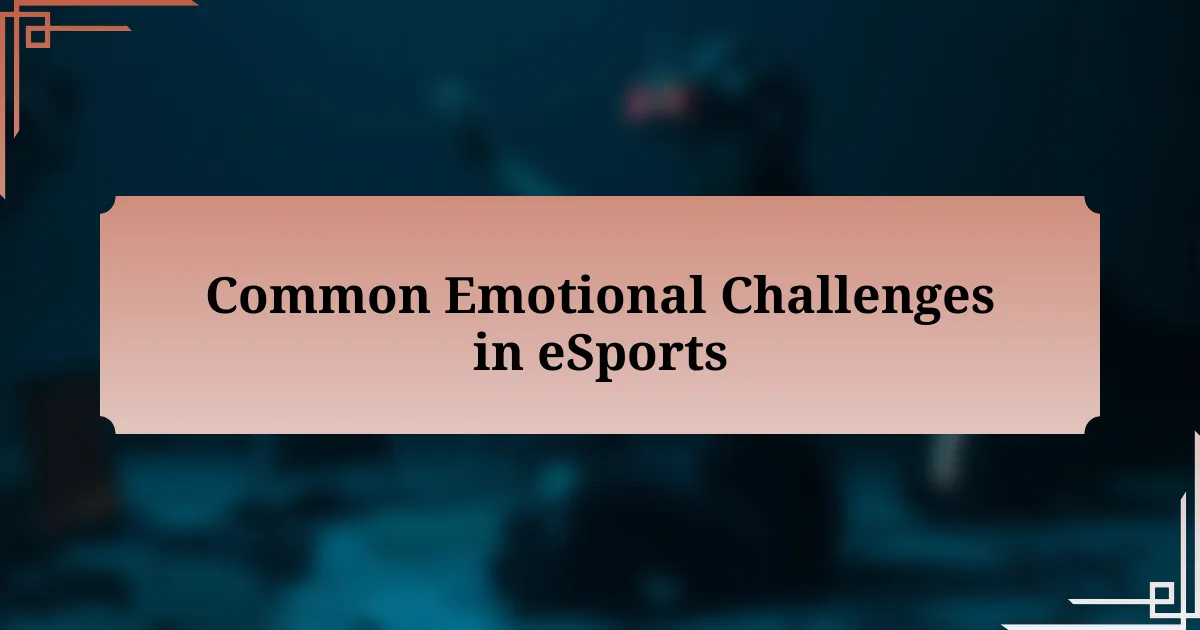
Common Emotional Challenges in eSports
Competing in eSports is often accompanied by a wave of anxiety and pressure that can feel suffocating. I vividly recall preparing for a big tournament, feeling that nervous energy build-up in the days leading up to the event. It can be challenging to channel that anxiety productively, and I often found myself second-guessing my decisions mid-game. Has anyone else experienced that tension that just seems to spiral out of control right before performance?
Another emotional hurdle is the isolation that can come with fierce competition. During one of my experiences, I felt disconnected from friends outside of gaming while focusing solely on my team. It was as if I was trapped in this bubble of pressure, and I realized how crucial it is to balance gaming passion with personal relationships. Have you ever felt such a strong compulsion to win that you inadvertently push others away?
Moreover, dealing with online commentary can add another layer of emotional complexity. I remember after a particularly tough match, reading through social media reactions only deepened my frustration. The hurtful comments made me question my abilities and fueled self-doubt. How do we learn to navigate the opinions of others while maintaining our confidence? This is a challenge every gamer must confront on their journey.
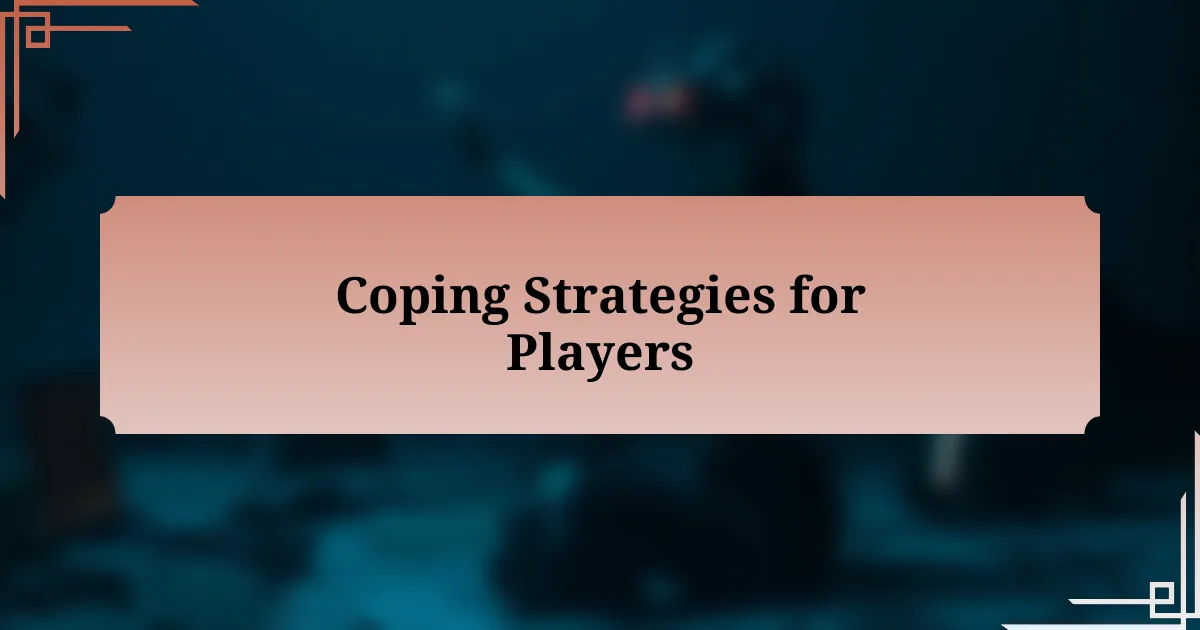
Coping Strategies for Players
Finding effective coping strategies is essential for managing the emotional ups and downs of tournament play. One method I discovered is establishing a pre-game ritual. For instance, I developed a routine that involved visualization techniques where I picture myself successfully navigating challenging scenarios. This practice not only calmed my nerves but also gave me a clearer focus going into matches. Have you ever noticed how a little mental preparation can shift your mindset entirely?
Another strategy that has helped me immensely is fostering a support system. I made it a point to connect with fellow players, sharing both triumphs and setbacks. Feeling understood and supported made a world of difference; it was comforting to know that I wasn’t alone in my struggles. Have you found others who resonate with your experiences? This camaraderie can play a pivotal role in emotional resilience.
Additionally, I learned the importance of taking breaks. After an intense gaming session or a tough match, I would step outside for fresh air or engage in a completely different activity, like reading or going for a walk. This downtime not only helped me process the game but also prevented burnout. How often do we forget that stepping back can be just as vital as pushing forward? Finding that balance is key to maintaining long-term enjoyment in eSports.
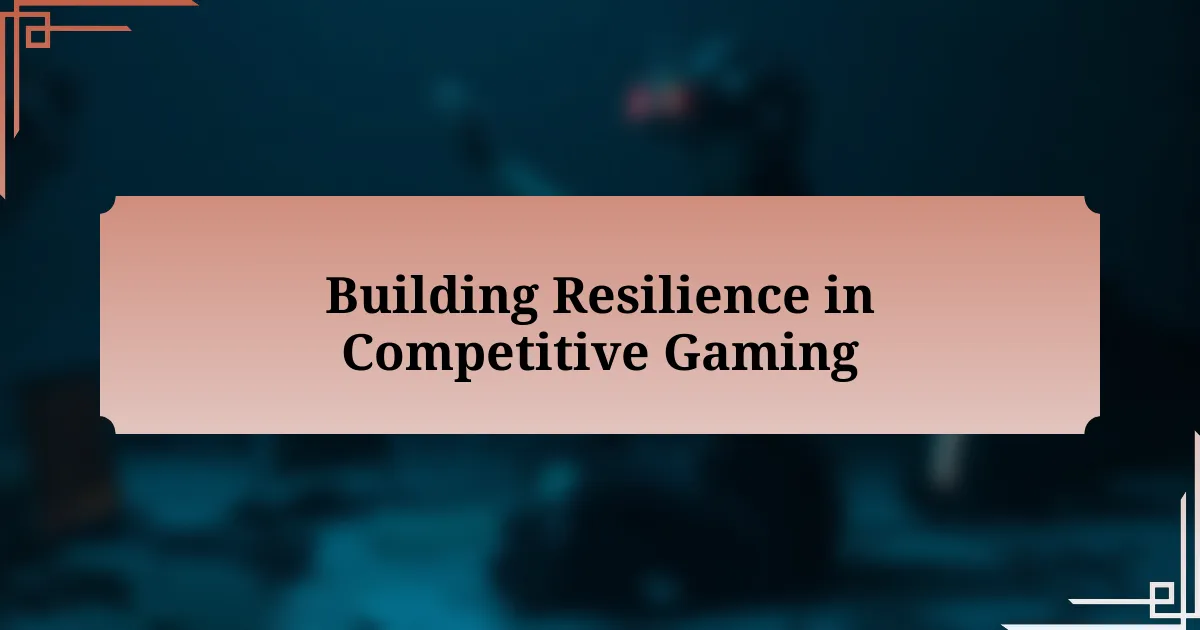
Building Resilience in Competitive Gaming
Building resilience in competitive gaming is all about embracing the highs and lows of tournaments. I remember a specific instance during a major event when I faced a particularly disappointing loss. Instead of spiraling into self-doubt, I chose to reflect on what I could learn from that match. The moment I shifted my focus from the defeat to personal growth, I felt empowered. How often do we allow a single setback to overshadow our accomplishments?
Another aspect of building resilience is understanding the importance of self-compassion. There was a time when I was overly critical of myself after a bad round, replaying my mistakes in my head. But I realized that this approach only amplified my anxiety. I began treating myself with the same kindness I would offer a teammate; I would analyze the situation, acknowledge my feelings, and remind myself that everyone has off days. This perspective shift not only improved my emotional well-being but also helped me perform better in future matches.
Lastly, establishing a mindset of adaptability has been transformative for my resilience. During one tournament, my strategy unexpectedly fell flat against a team I hadn’t anticipated. Instead of clinging to my original plan, I quickly adjusted my approach mid-game, which taught me the power of flexibility. How prepared are you to change your strategy on the fly? Embracing adaptability fosters a stronger mental game and makes it easier to bounce back from disappointments in the heat of competition.
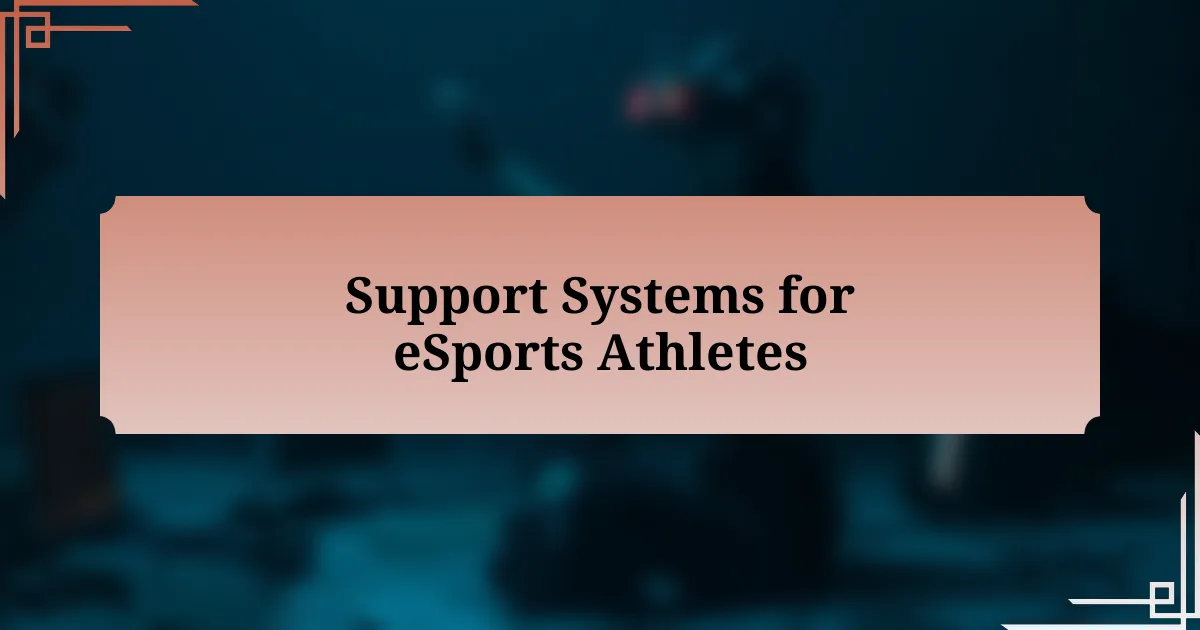
Support Systems for eSports Athletes
Support systems are crucial for eSports athletes navigating the emotional rollercoaster of tournaments. I recall a time when my team faced a crushing defeat; it was a web of frustration and self-doubt. However, the presence of my teammates, rallying around me with words of encouragement, transformed my shock into motivation. How vital is it to lean on our community during tough times? For me, it was the difference between wallowing in despair and rising to train harder for our next challenge.
Coaching also plays a significant role in providing emotional support. I once had a coach who not only analyzed gameplay but also prioritized mental well-being. After a particularly rough tournament, he sat me down and reminded me that setbacks are a natural part of growth. His words resonated deeply—why do we often forget that every champion faces hurdles? That simple chat provided immense perspective, reinforcing that we should expect and embrace challenges rather than fear them.
Moreover, establishing a support network beyond the game can be a game-changer. I found solace in talking to fellow players and friends who weren’t directly involved in eSports. Sharing experiences and emotions with them has been incredibly refreshing. It reminded me that sometimes, taking a step back and discussing life outside of the tournament can recharge our mental batteries. Have you tried connecting with those who understand your journey, but aren’t caught up in the competitive scene? This balance can lead to profound emotional recovery and overall resilience.
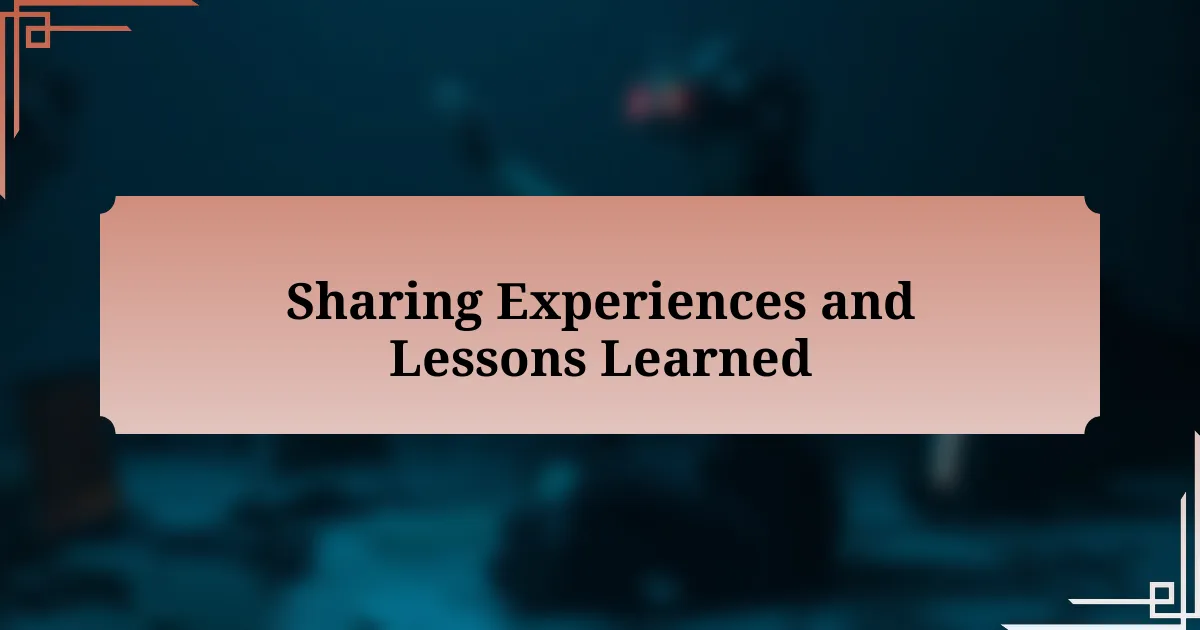
Sharing Experiences and Lessons Learned
Sharing experiences is a powerful way to process the emotional ups and downs of tournaments. I remember sitting with a group of fellow gamers after a particularly intense match where we felt we had let ourselves down. Someone opened up about feeling the pressure to perform, and suddenly, it was like a weight lifted off our shoulders. Was I the only one struggling with self-imposed expectations? Hearing others’ stories made me realize that vulnerability fosters connection, and it’s crucial to share those feelings instead of bottling them up.
Reflecting on lessons learned from these shared encounters is equally important. I once hosted a small gathering where we discussed our worst tournament moments. Each story revealed common threads—doubt, anxiety, and the drive to improve. One friend mentioned that these experiences, though painful, were stepping stones toward success. This made me think: what if we reframed our setbacks not as failures but as vital learning opportunities? I found that embracing this mindset has transformed the way I approach both gaming and life.
As I continue to engage with my peers, I notice that these conversations often lead to practical strategies for coping with tournament pressures. For instance, I started meditating before matches after noticing how much calmer I felt during game time when I practiced mindfulness. Have you tried integrating such techniques into your routine? Sharing these personal tips not only helps me but reinforces the importance of learning from one another. Ultimately, it’s clear that the emotional journeys we navigate in eSports can be better managed through open dialogue and collective wisdom.

